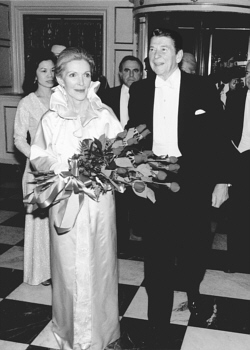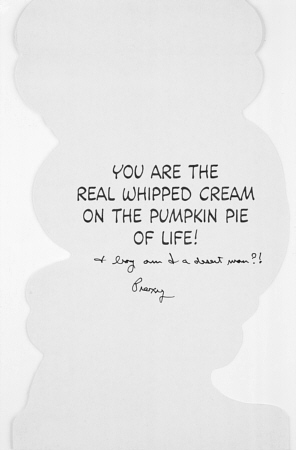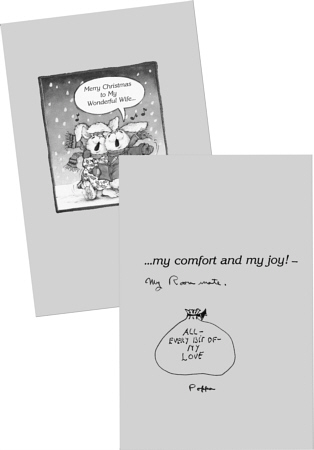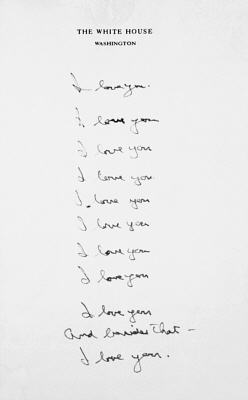I Love You, Ronnie (14 page)

A note and doodle from my “roommate.”
Just think we were married 28
minutes
ago. Yes, I know the calendar says years but what does it know? Time goes by faster when you are happy and I’m the happiest man in the world. I still think we should clone you. Then we’d leave the clone there and I’d bring you with me.
I’ve just figured out that if I keep on loving and needing you more at the same rate of increase for the
next
28 years, every day will be valentine’s day and I won’t be able to let you out of my sight for more than 5 minutes at a time.
I guess when I was young I thought marriage might be this way for a while: I never knew it could go on and on, getting better and better year after year.
By now you must have figured out that I’m hinting, I love you more than anything in the whole, wide world. I’m running for re-election as your own totally dedicated husband.
I love you
Your husband.
P.S. I’m the fellow who sent the roses.
Campaigning consumes all your energy—mentally and physically. My memory of the 1980 campaign is just a big blur. I remember sinking into bed at night, absolutely exhausted. Ronnie would be so tired that he’d fall asleep right away. I usually would read for a while. Then I’d be hungry, and I wouldn’t know what to eat. I didn’t want to eat apples, because I was afraid that the crunching would wake Ronnie. So I’d eat bananas, which were soft and which, I figured, Ronnie couldn’t hear. So then it got to be a joke between us. When we traveled, Ronnie would put bananas by my side of the bed.
I remember how I used to have fun with the press, too. On the campaign plane, I would take an orange and roll it down the aisle, and if it could get to the end of the aisle where the reporters were, I’d have won a great big victory. It got to be a routine, and then the press started putting up blocks—roadblocks—to stop my oranges. You can have a good time campaigning, and there can be camaraderie with the press—that is to say, as much as you want there to be.
—
On election night, in November 1980, we were at home in Pacific Palisades. I was in the bathtub, and Ronnie was in the shower. Ronnie loved to take long, long showers; he would think about his speeches and then write down his thoughts on 3 × 5 cards afterward. I had turned the TV up loud before I got in the tub so we could hear it better. Suddenly, I heard John Chancellor saying that Ronnie had won the election. I banged on the shower door, and Ronnie came out. We stood before the set wrapped in our towels and listened.
“I don’t think this is the way it’s supposed to happen,” I said. It wasn’t the way I’d envisioned it, at least. Next thing we knew the phone rang, and it was President Carter calling to concede and to congratulate Ronnie. We turned to each other in surprise. It was unusual for a president to call before the polls had closed. We couldn’t quite believe it.
Yet, there it was—we were on our way to the White House.

The first inaugural ball, 1981.
B
ecoming president didn’t change Ronnie at all. In the White House, he went on being the same man he’d always been—in Hollywood, in Sacramento, at home with me. Of course, his responsibilities were huge—and he felt them. But we kept up our private routines as much as we could. In Ronnie’s rare moments alone, he still jotted off little notes to me, to say “Hello,” “Where are you?” “I miss you,” “I need you.”
THE WHITE HOUSE
Dear Mommie, Poo Pants, 1
st
Lady, Nancy,
(How did I get so many wives?) Never mind. I love them each and every one. I know it’s Feb. 4
th
—not Feb. 14
th
and not March
4
th
—but I can’t stand it any longer. Happy Valentine’s day!! Happy Anniversary!!
I love you,
Poppa, Poo Pants, 1
st
Guy, Ronnie

I found this message on a Thanksgiving card on my breakfast tray at the White House.
To Mrs. Reagan (That sounds beautiful to me),
I’ll be happy every minute I love you as my wife.
Your Husband—Your Happy Husband!
RONALD REAGAN
Welcome home little “Poopchin.”
I’ve missed you and can’t wait to get home tonight.
The song was sent to us by a lady who thought it was very appropriate for us. Of course she’s right.
The cups and saucers on your desk were another gift.
I miss you, I love you, I miss you, I love you etc. etc. etc. Well, I’ll be with you soon and if I haven’t made it clear I really do love you.
Your Husband
On special occasions, I’d go over to his office and have lunch with him and we’d exchange our usual cards. I’d still get my beautiful Christmas letter and, though we always celebrated Christmas in Washington so that our Secret Service agents wouldn’t have to leave their families, Ronnie still called my friends in California just before the holidays to find out what to buy me as a present. And no matter how busy he was with his duties as president, he always remembered our anniversary.
THE WHITE HOUSE
WASHINGTON
March 4, 1981
Dear First Lady
As Pres. of the U.S., it is my honor & privilege to cite you for service above & beyond the call of duty in that you have made one man (me) the most happy man in
the world
for 29 years.
Beginning in 1951, Nancy Davis, seeing the plight of a lonely man who didn’t know how lonely he really was, determined to rescue him from a completely empty life. Refusing to be rebuffed by a certain amount of stupidity on his part she ignored his somewhat slow response. With patience & tenderness she gradually brought the light of understanding to his darkened, obtuse mind and he discovered the joy of loving someone with all his heart.
Nancy Davis then went on to bring him happiness for the next 29 years as Nancy Davis Reagan for which she has received & will continue to receive his undying devotion forever & ever.
She has done this in spite of the fact that he still can’t find the words to tell her how lost he would be without her. He sits in the Oval office from which he can see (if he scrooches down) her window and feels warm all over just knowing she is there.
The above is the statement of the man who benefited from her act of heroism.
The below is his signature.
Ronald Reagan—Pres. of the U.S.
P.S. He—I mean I, love and adore you.

A Christmas greeting and a doodle.

I had this note framed and keep it on my desk today.
While we were in the White House we spent as much time as we could together. Whenever we could, we made weekend trips to Camp David. Camp David! When I think about it now, it seems like another life—which, I guess, it was. It was such a wonderful place. I had heard so much about it and was so anxious to see it, and was happy to find it was all I had hoped for. Jimmy Carter had at one point considered selling it—he hadn’t, thank God (he discovered that he liked it). But when we first started going out there, it needed some work. I did some gardening and some work on the cabins, which I really enjoyed. And Ronnie enjoyed himself in his own usual ways—being outside and riding, in particular. The Secret Service didn’t want him going too far at first, but as time went by, he’d suggest adding a little more to the trail and then a bit more and a bit more, until, by the end, he had the kind of substantial ride he was used to.
Sometimes, just the two of us went to Camp David (that is to say, the two of us plus the Secret Service, the White House doctor, someone from the press office, and other White House staff—that’s solitude during the presidency). Sometimes Ron and his new wife, Doria, would come, or a couple of close friends, like Charles and Mary Jane Wick and their children. But we never made a big social event out of it. What we really enjoyed doing there was relaxing, wearing blue jeans, reading, riding horses, watching movies—just generally doing the kinds of things that we’d always done on the ranch back home.
I think that’s largely why we didn’t find Washington strange or lonely the way many people who move there from other places say they do. We were still together all the time, and we were still us—with Ronnie on the left side of the bed and me on the right, waking up with our breakfast trays and our King Charles spaniel, Rex, a gift from Pat and Bill Buckley, jumping into bed between us. We added many new people to our lives who are still friends. Of course, living in the White House, if we wanted to make new friends, we had to reach out—just as anyone who moved to a new city has to do.
Making these new friends and bringing them home to Ronnie was part of the fun for me, and a big part of what I saw my job to be as first lady. There was also the work I’d begun in California: the Foster Grandparents and the drug program. The drug program, now on a national scale, took a lot of time. But it was also particularly rewarding.
Its best-remembered slogan, “Just Say No,” had actually come into being during a visit to a school in Oakland. I was talking to a class of fifth graders when a little girl raised her hand and said, “Mrs. Reagan, what do you do when somebody offers you drugs?”
“Well,” I had said, “just say no.”
Somehow that caught on. I’m sure people thought it was a PR strategy that we’d worked out in the White House, but it really came about by accident. Obviously, it wasn’t the whole answer to the drug problem, but it was useful and effective. It became a rallying point. You saw it on milk cartons and billboards, and you still hear it used today. I’ve always been proud of that, and of the work we did.
At the top of my list of duties as first lady, though, was taking care of Ronnie. I still considered that to be my most important job, as it had always been. For that matter, I do believe that taking care of the president is the most important thing a first lady can do—the essential thing, in fact, that she
must
do—because she is the person in the White House who knows him best. There are other people around who are supposed to take care of everything else—his scheduling, his briefings, his cabinet, his relations with the press. But the first lady is the only one who can really take care of the president’s personal needs. She’s the only one who really knows what’s needed—at least, I think she should be.